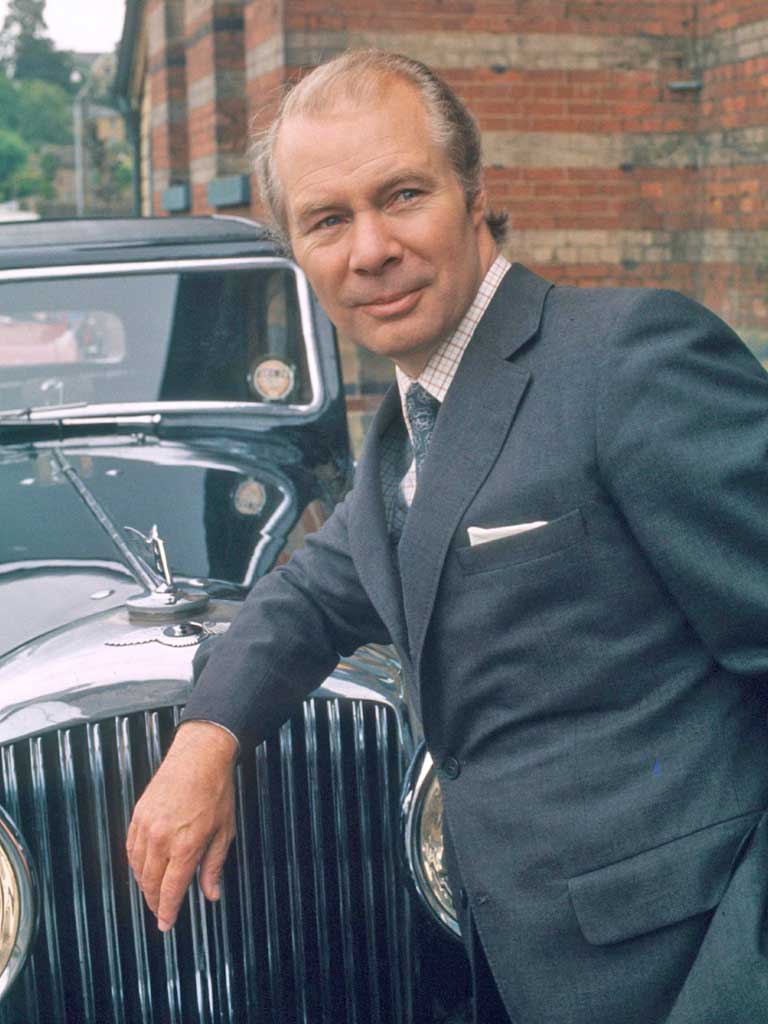Anthony Bate: Actor who made his name with a cold, stern persona and an aura of menace
He excelled as the archetypal middle-age man whose slumbering demons within have been woken

In his 50-year career, Anthony Bate became one of the most recognised faces and least recognised names on British television, his stern persona and cold, surgical manner consistently adding menace or chagrin to everything from sophisticated thrillers to period drama.
Bate's immaculate appearance and intimidating composure made him especially suited to espionage, and two of his most noted television roles were as spy Kim Philby in Granada's 1977 play Philby, Burgess and Maclean, and as Lacon in Tinker, Tailor, Soldier, Spy for the BBC in 1979. But cunningly, it was also that stifling sobriety and imperviousness that could make his deft ability to break into fury or confusion all the more affecting, and for many years he excelled as the stony middle-aged man who had inadvertently wakened a slumbering demon within him.
The child of hoteliers, Bate was born in Stourbridge, Worcestershire, and showed a passion for literature and drama at King Edward VI school. On VE Day his parents opened the North Bank Hotel at Seaview on the Isle of Wight, and while helping out behind the bar his future wife Diana coaxed him into joining the local amateur dramatics society. He soon enrolled at the Central School of Speech and Drama alongside Kenneth Haigh, Barry Foster and Harold Pinter. He graduated a gold medallist, and after National Service with the Royal Navy Volunteer Reserve, made his professional stage debut in Worthing in 1953.
He made his West End debut in Inherit the Wind at St Martins in 1960, a dramatisation of the 1925 trial of John T Scopes for teaching Darwin's theory of evolution to a high school science class, which had already ran successfully on Broadway three years earlier, the London opening coinciding with the release of the Spencer Tracy film version.
An echo of many future successes came in 1966 when, at the Hampstead Theatre, he starred opposite Wendy Craig and Moira Redmond in Giles Cooper's fascinating last play, Happy Family. In a disturbing study of a strangulated Middle England family, Bate won excellent reviews as the outwardly mature Mark, whose gradual exposure as a neurotic child illustrated well his ability to usurp an audience's carefully crafted preconceptions of him.
In some ways Giles Cooper's unhinged successor, John Hopkins, became television's finest exponent of emotional nausea among the middle classes, and Bate was perfect to star in his frequently furious theatre work, including Find Your Way Home at Euston's Open Space Theatre in 1970, in which he played a staid family man trapped in an affair with a self-destructive male prostitute.
Bate's stillness and deceptive stateliness made him a superb television player, and he guested in everything from Dixon of Dock Green to a returning role as a barrister in Granada's Crown Court. The peak of his career coincided with the heyday of the television thriller, and he made strong impressions in many anthology series including Menace (1973), Shadows of Fear (1971) and Murder (1976).
Particular noteworthy was the two- hander “During Barty's Party” for Nigel Kneale's Beasts (1976), a stunning two-hander in which Bate and Elizabeth Sellars, shut into a chilly marriage, are trapped in their home as a plague of rats gnaw through the floorboards. The play ratcheted up the tension to astounding levels as once again the urbane Bate transformed from dismissive businessman to petrified infant.
Another typically sharp performance came in the Inspector Morse episode “Last Bus to Woodstock” in 1987. Michael Wilcox's astute dramatisation of Colin Dexter's seedy mystery smothered the story with references to the libertine poet John Wilmot, 2nd Earl of Rochester, and Bate excelled as an Oxford don tempted by his studies to take timid yet fatal steps towards debauchery.
His highest profile role on television was as the lead in LWT's intensive study of midlife crisis Intimate Strangers (1974), which boasted fine scripts by, among others, Julian Bond and Andrea Newman, a ghost of the latter's future success with Bouquet of Barbed Wire, a saga that in many ways was a blood sister to the serial. Other television roles included being cast against type as a union leader in YTV's The Main Chance (1969), a performance that rewarded him with his own spin-off series, Grady (1970), a psychiatrist in Dennis Potter's Moonlight on the Highway for LWT (1969), Nikolai in Fathers and Sons (1971) and Javert in the BBC's Les Miserables with Frank Finlay in 1967. His film appearances were less plentiful, but as a television actor his precision and intelligence made him one of the most valuable of his generation.
Anthony Bate, actor: born Stourbridge 31 August 1927; married 1954 Diana Fay (two sons); died Bembridge, Isle of Wight 19 June 2012.
Subscribe to Independent Premium to bookmark this article
Want to bookmark your favourite articles and stories to read or reference later? Start your Independent Premium subscription today.

Join our commenting forum
Join thought-provoking conversations, follow other Independent readers and see their replies